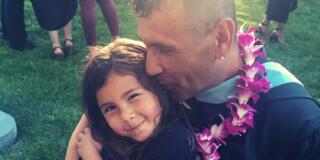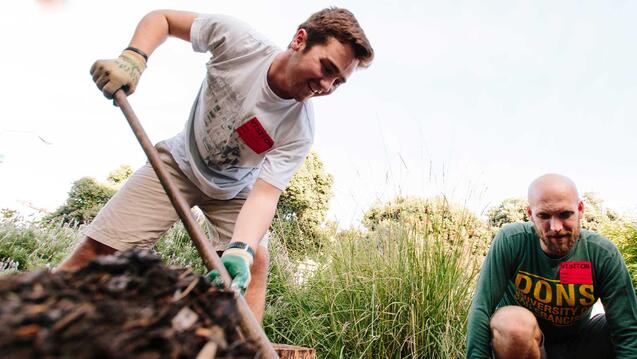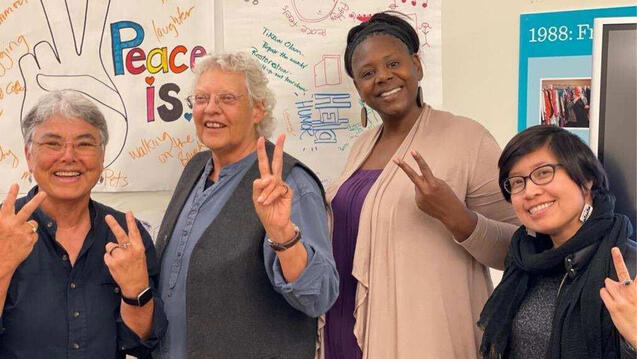Tough Love, Real Talk

“I was a high functioning addict. I did well in school but I also did drugs everyday,” admits Adrian Maldonando, MFT ‘17.] “Looking back, I was emotionally stunted, emotionally inarticulate, and not dealing with the trauma in my life.”
Maldonado was addicted to heroin for over 17 years. Now, 20 years sober, he has earned his Master of Arts degree from the University of San Francisco’s Marriage & Family Therapy Program and works for San Mateo County in the Correctional Health Services Division.
Making the Right Choice
Born and raised in Redwood City to a working-class, Mexican family, Maldonado recalls his father’s challenges as an immigrant and having to endure abusive projections of fear, struggle, and frustration.
“Intergenerational trauma is real and we often don’t acknowledge it or have the words to express ourselves when we’re living the repercussions of it,” he said.
Maldonado turned to drugs as a way of coping with trauma. In 2000, he was arrested, and after violating his probation, a judge gave him two options: spend two years in county jail or join the Choices Program.
The Choices Program is exclusively for inmates (referred to as clients) at the San Mateo County Jail and is an adaptation of San Francisco’s infamous Delancey Street, a residential self-help organization for former substance abusers and ex-convicts. Like Delancey Street, The Choices Program takes place in housing units operated by staff. With the exception of program counselors and clinicians, the staff is comprised of Delancey Street graduates and Choices Program alumni.
The structure of the program itself follows a co-occurring, multi-disciplinary, and comprehensive therapeutic community model. It is also intentionally horizontal, encouraging staff to share their personal stories of struggle, pain, and failures while on the road to recovery.
Living Life with a Purpose
The Choices Program is full of “tough-love and real-talk,” said Maldonado. Clients are held to high standards and strict rules are enforced: no drugs, no alcohol, no threat of violence, and no physical violence, all of which Maldonado describes as “go-to coping methods” for drug addicts. Inmates are also required to attend regular sessions with mental health clinicians who help address issues related to trauma and behavior.
“When I first started Choices, I wasn’t interested in getting clean,” Maldonado said, “I just didn’t want to go to jail.” But after his time in Choices, Maldonado moved onto the Delancey Street Program where he stayed for five years.
After leaving Delancey Street, Maldonado finished his undergraduate degree and became a union organizer for more than 10 years. “I was known to be an over passionate and radical organizer,” he said. “The important part was this: I didn’t use drugs. I didn’t steal. And, I was living life with a purpose.”
Maldonado returned to Choices as a counselor while getting his Master’s degree in Marriage & Family Therapy at USF. His deep commitment to social justice by providing mental health services for inmates in recovery earned him the School of Education’s Social Justice Scholarship.
“What’s been helpful with my degrees is that I can now address trauma and mental health from a clinical perspective,” he said. “At the same time, I connect to clients on a personal level. I’m not a counselor trying to understand their experience. I was there, that was my reality.”
Soon after starting, he was quickly promoted to be the program’s manager. Under his leadership, the clients are pushed to engrain principles of social justice. Programming at Choices regularly involves community service projects and inmates are regularly pushed to see themselves as human beings of value who contribute to society.
“I see this as a chance to offer clients a pathway to social justice activism,” said Maldonado.
Maldonado’s efforts and dedication have proven successful time and time again, with clients who have graduated from the program and afterward being 3 times less likely to be arrested, convicted, or incarcerated after being released from jail.
While at USF Adrian Maldonado MFT ‘17 was awarded the USF School of Education’s Social Justice Scholarship. To learn about more Social Justice Scholars, contact Tina Burgelman, Director of Development.


